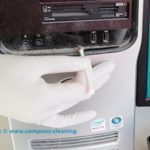Germs are spread in body fluids in the following ways:
➊ Direct contact: when body fluids are directly transferred from one person to another. Examples of direct contact are touching and kissing. An animal bite is another example.
➋ Droplets: when secretions fly out of kids’ (and adults’) noses and mouths (when they sneeze, cough, spit, drool, slobber, or vomit) into the air and then land on a hard surface or are inhaled by another person.
- Droplets can fly only a short distance, usually 3 feet or less, but if they land on another child’s eye, nose, or mouth they can spread disease.
- Germs can also be spread when children touch droplets that land on a surface like a table and then touch their own eyes, mouth, or nose before washing their hands.
- Most of the germs that can be spread by direct contact can also be spread by droplets.
- Germs that can spread by droplets are more contagious than germs that require direct contact. When an infection can spread among people that are only near each other, the infection is more contagious. Diseases caused by viruses and bacteria can be spread this way.
- Fungi and parasites are not transmitted by droplets.
- Germs live longer on stainless steel, plastic, and similar hard surfaces than they do on fabric and other soft surfaces. Germs also live longer when the surface is wet and dirty. Food and water on a surface provide germs with all they need to survive and multiply! When droplets land on a hard surface like a table or a doorknob, the viruses in those droplets can live several hours or more. Bacteria can live for even longer.
➌ Airborne transmission: when germs float suspended in the air attached to small droplets or dust particles and travel more than 3 feet.
- Airborne germs can travel across a room, down a hall, into a ventilation system, to another floor, or even from one building to another where another person can breathe in the germ.
- Germs that spread by airborne transmission are the most contagious of all. We can inhale them deep into our lungs where they can cause more serious illness. Disinfecting doesn’t help with the spread of these kinds of illness.
- Luckily, not very many germs can travel this way. Those that do are difficult to control. For example, the viruses that cause chicken pox and measles are spread by airborne routes. Nine out of ten unvaccinated people who breathe the air of a person infected with chickenpox or measles will get sick. Cleaning and disinfecting will not prevent air-borne illnesses. This is why vaccination is so important. It is the only way to protect yourself and children from these extremely contagious diseases.
➍ Fecal-oral transmission: when germs in stool from one infected person make their way into the mouth of another person. These germs usually cause vomiting and diarrhoea.
- This happens most commonly when infected people don’t wash their hands after using the bathroom.
- When dirty hands touch food, the germs from that person’s stool are transferred to the food. When that food is eaten by someone else, the germs enter their body and they can get sick. For example, a toddler touches her dirty diaper, doesn’t wash her hands, then takes crackers from a shared bowl, leaving germs on the crackers. Other children who eat crackers from the bowl can get sick.
- When dirty hands touch surfaces or objects, the germs are transferred there. When another person touches those same surfaces, he gets the germs on his hands. If he eats or puts his hands in his eyes, nose, or mouth without washing them, the germs get into his body and can make him sick.
- Infections from animals can also be spread this way. For example, reptiles and rodents have caused Salmonella outbreaks in ECE programs. They also carry germs on their skin which can cause illness through direct contact.
- Some common viruses, including Hepatitis A, Norovirus, and Rotavirus, are spread through faecal-oral routes. They may also be spread by droplets that are produced when a person vomits – this makes them very hard to prevent!
- Handwashing is our best defence against germs spread by the faecal-oral route!
➎ Blood: when an infected person’s blood enters another person’s body through a break in the skin. Many of the germs that can be found in blood can cause life-threatening disease. However, most blood-borne infections come from infected needles, not from bleeding knees on the playground.
Luckily, infections from blood-borne germs are easily prevented by:
- teaching children not to touch blood and to tell an adult when there is an injury that involves blood.
- If children and staff know their jobs when it comes to blood, they can prevent the transmission of infectious diseases through blood in ECE.
➏ Insect bites: when an insect transmits bacteria and viruses to humans through their bites. West Nile virus is a disease that is transmitted by mosquitoes, which are insects.





